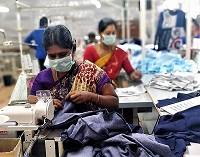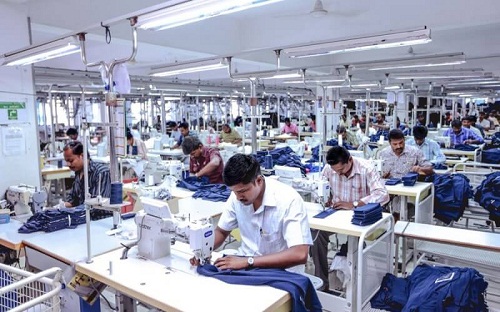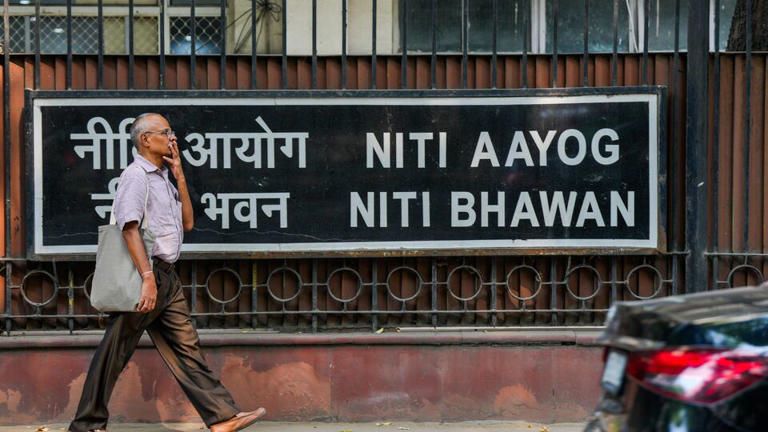"Once touted as the ‘knitwear capital of India, Tirupur, is currently mired by labor issues. Underemployment and rising costs of living, coupled with the continuing impact of policy measures such as the Goods and Services Tax, especially on small-scale manufacturers, is stagnating growth in the city with the shortage of workers leaving medium and larger garment manufacturers dependent on migrant labourers."
 Once touted as the ‘knitwear capital of India, Tirupur, is currently mired by labor issues. Underemployment and rising costs of living, coupled with the continuing impact of policy measures such as the Goods and Services Tax, especially on small-scale manufacturers, is stagnating growth in the city with the shortage of workers leaving medium and larger garment manufacturers dependent on migrant labourers.
Once touted as the ‘knitwear capital of India, Tirupur, is currently mired by labor issues. Underemployment and rising costs of living, coupled with the continuing impact of policy measures such as the Goods and Services Tax, especially on small-scale manufacturers, is stagnating growth in the city with the shortage of workers leaving medium and larger garment manufacturers dependent on migrant labourers.
Contrary views impact development
Stakeholders rue the fact that there isn’t enough work in the once vibrant textile industry of the city. With declining demand, Kavya Garments owner Dhandapani recently sacked nearly half his tailors. However, a few tailors knock on his doors almost every day looking for work, a sight that is common at job work units across the city.
However, garment units in the city hold a contrary view. As TR Vijaya Kumar, Managing Director, CBC, notes, there is an acute shortage of workers in the city for jobs like stitching, cutting, checking quality and ironing. This leaves medium and larger garment manufacturers dependent on people migrating from other states in search of better opportunities. Tirupur can currently accommodate two lakh labourers who can be trained however lack of awareness prevents this form happening.
workers in the city for jobs like stitching, cutting, checking quality and ironing. This leaves medium and larger garment manufacturers dependent on people migrating from other states in search of better opportunities. Tirupur can currently accommodate two lakh labourers who can be trained however lack of awareness prevents this form happening.
Kumar claims that every export house in Tirupur is facing around 30 per cent shortfall in labor. This shortage is among the reasons that several garment companies in the region have shifted their units from Tirupur to other cities, states and even countries, according to him.
Refuting this allegation, members of Tirupur’s blue-collar workforce, especially those in job work units, argue that fluctuating raw material prices and increasing competition from migrant laborers, finding stable work has become difficult for them. The local workforce also blames migrant workers, who charge less than the locals, for the loss for their jobs. who agree to work for less money.
Other issues impacting hiring
As a labour contractor states, the current labor shortage is also a result of companies not willing to increase salaries commensurate with worker’s demands after the implementation of GST in 2017. Before GST, the companies would pay them a salary of around Rs 300 per shift. Tailors would get around Rs 350 per shift. But now, with companies facing GST and other problems due to bank procedures, they are not able to give this kind of salary anymore. This has affected around 25,000 small-scale companies.
Some export houses hold demonetisation responsible jobs losses in the city. They say, GST has made employment difficult as the duty drawback scheme has been eliminated, increasing the costs of the manufactures. Companies expect the new government to perform better by granting them some sops and incentives that would enable them to hire new people.
And as DK Pant, Chief Economist, India Ratings points out even if some companies increase their access to the domestic market, their profit margins would be impacted, resulting in further slower hiring. Moreover, factors like Tirupur’s own economic development coupled with an increase in rental, food and transport costs, would result in demand for higher wages, further impacting employment. The unavailability of good quality labor gives rise to a struggle between manufacturers and laborers which each holding the other responsible for the current plight in the industry.












